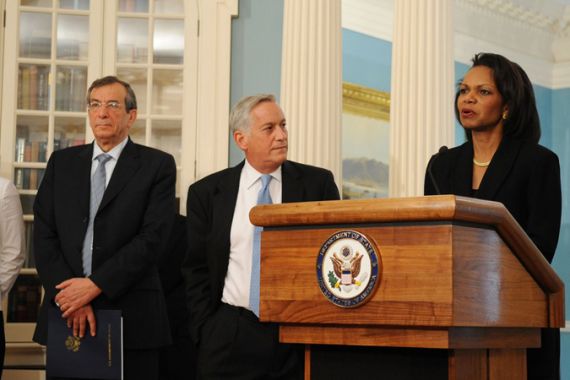Have you heard of the American Task Force on Palestine?
A ‘task force’ that alleges to speak on behalf of Palestinians is nothing but a sham, says author.

The above image is licensed under Creative Commons.
Cairo, Egypt – The Palestinians are in crisis. Their leaders are weak and self-interested. Opportunists work to fill the void.
Many Palestinians haven’t heard of the American Task Force on Palestine (ATFP). I only learned about it a few years ago – when someone asked me if I’d seen the web pamphlet condemning the one-state solution. I hadn’t. Several minutes spent browsing ATFP’s website made it pretty clear why.
ATFP was built in the best tradition of the Ahmad Chalabi school of Diaspora governance. It is a Washington organisation designed to promote a particular line on Palestine.The group is tasked with feeding the State Department palatable fictions – like, “two states for two peoples”. In return, organisation heads are invited to dinners with important people.
Ziad Asali, ATFP’s president, recently attended a celebration of Israel’s “independence” where he posed for friendly photos with Israel’s ambassador to the United States. While Asali never had credibility among Palestinians, his recent night out secured his status as an object of derision.
|
“While Asali never had credibility among Palestinians, his recent night out secured his status as an object of derision.” |
Palestinians typically “celebrate” the creation of Israel with somber commemorative ceremonies. For most of us the foundation of a Jewish-majority state most strongly evokes the Nakba, the lamentable ethnic cleansing of Palestine. And because Palestinians are still subjected to apartheid and occupation, the anniversary of our Catastrophe has a greater-than-historical significance. The Nakba is as much about today as it is about what was done 1948.
Asali’s complete disconnect from history, the current reality in Palestine, and his insensible behavioural norms underscore his alienation from Palestinian-Americans. But that should not come as a surprise. Despite his claims, he never represented the community.
Today, thousands of Palestinian political prisoners are in Israeli jails. Roughly fifteen hundred of them recently protested their illegal detention through hunger strikes. The heart of the Palestinian-American community is in Israeli prisons, not Israeli embassy-sponsored parties. Smart analysts at the State Department should take note, even if ATFP failed to.
At this moment it is easy to regard ATFP with contempt. But Asali is not the only party responsible for his embarrassing behaviour. Orengate or Asaligate or whatever is an indication of a broader failure among the Palestinians. Today, there is no credible leadership – not in Palestine and not in the Diaspora.
All Palestinians share in that failure. But Palestinian-Americans own more of it than anyone else.
The Palestinian Authority has been illegitimate for a long time. “Security coordination” with Israel has enabled the occupation forces to stymie some of the most potent and non-violent challenges to apartheid. Individually, Mahmoud Abbas and Salam Fayyad have been effective at protecting their roles as occupation intermediaries. Only recently, the Palestinian Authority decreed that Abbas is beyond criticism. Journalists have been jailed for refusing to heed the absurd edict. And activists have been jailed for issuing legitimate challenges to the unelected “leaders” in the West Bank.
| Hamas bans Gaza’s lingerie displays |
The Hamas leadership is only marginally better – and only because the organisation does not actively coordinate its activities with the Israeli army. The legitimacy afforded by elections in 2006 has long since worn thin and fallen away. Attacks on non-Islamist groups, the restriction of commonsense freedoms, and a series of fundamentalist decrees have undermined the party’s status among Palestinians.
In Lebanon, Jordan and Syria, refugees are besieged by unfriendly governments. The obstacles to their organisational coherence are formidable. In Lebanon and Syria, Palestinian camps have been attacked and razed by the state. In Jordan, refugees are being stripped of their citizenship.
Because so many others live in repressive environments, Palestinian-Americans and their counterparts in the Western countries have greater share of the responsibility. Often well-to-do, they have failed to do enough. And with no good reason.
The reality is that opportunists like Asali can only thrive in an environment that allows excessive self-regard to masquerade as actual achievement. If the ATFP has succeeded in selling a lie to members of the American establishment it is only because Palestinian-Americans have not actively and persistently spoken out. There is no Palestinian Authority here to guarantee the prominence of the Asali-Israeli line – only pervasive indifference.
But the environment is changing. Among young Palestinians the apathy – or fear of being marginalised – is gone. A new assuredness has taken their place. More than ever before they are speaking out.
Ziad Asali does not represent Palestinians or Palestinian-Americans. He does not represent me or anyone I know. And he never did.
But his blunder has presented us with a challenge. Our voice has been hijacked and manipulated. We allowed that to happen.
What will we do to take it back?
Ahmed Moor is a Palestinian-American graduate student of Public Policy at Harvard University and co-editor of After Zionism (Saqi Books, July 2012).
